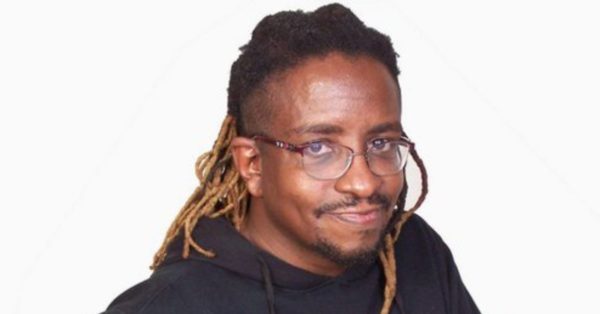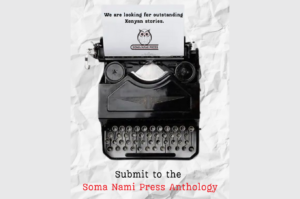
On 20 September 2014, while the Storymoja Hay Festival was ongoing, a group of writers met in the Nairobi home of postcolonial theory and political history professor Wambui Mwangi, to discuss the operation of the newly founded African Poetry Book Fund (APBF). Among those in attendance were the APBF founder Kwame Dawes, the poet Shailja Patel, author of Migritude, and the Miles Morland Scholarship-winning journalist Tony Mochama, then secretary of PEN Kenya.
Two days later, Mwangi tweeted that Mochama had sexually assaulted someone.
Dear Kenyan women,
It has happened again. Another woman has been sexually assaulted in a space she thought was safe. How many more times?— @wambui_mwangi (@wambui_mwangi) September 22, 2014
I want to know if those who read Tony Mochama’s words know they are reading the words of a sexual assaulter.
— @wambui_mwangi (@wambui_mwangi) September 22, 2014
A press release from Patel’s lawyer Ann Njogu, published on 25 September 2014 on Pambazuka News, stated that “Mr. Tony Mochama committed an indecent act upon the person of poet and activist Shailja Patel,” and that “Today at 12 noon, Ms. Patel filed a police report at Spring Valley Police Station,” having “stated that she would seek restorative community justice rather than engaging the judicial system.”
“Each time a man sexually harasses or assaults a woman with no consequences, he is emboldened to repeat and escalate that behaviour,” Patel stated. “It becomes a pattern. Sexual predators are not born; they are the product of patriarchies and rape cultures that teach men they are entitled to the bodies of all women. When a man invades a woman’s body space without her invitation, touches, grabs and gropes her without her consent, he violates her sovereignty of person. He evicts her from her own body. Our bodies are our first homes. If we are not safe in our bodies, we are always homeless. Let us stand with all victims and survivors of sexual harassment and sexual assault. Let us create a society where sexual violence is unknown.”
The accusation caused sharp splits in the Kenyan literary and activist scenes, with the late Binyavanga Wainaina taking Mochama’s side at a point, which caused even greater divisions.
@KenneMwikya Yes. and I want to know exactly how you all came to the conclusions you did. Many do.
— Binyavanga Wainaina (@BinyavangaW) September 28, 2014
The activist Wanjeri Nderu, who was present at the event, maintained that there was never an assault.
As more accusations of racism, rape apology and agenda flew across divides, the hashtag #StopTonyMochama trended on Twitter.
I stand w @shailjapatel, @wambui_mwangi and all victims and survivors of sexual harassment and sexual assault everywhere. #StopTonyMochama
— Decriminalize you cowards! (@KenneMwikya) September 24, 2014
Very happily, other men were willing to tell the truth. This man won’t be able to twist this narrative to suit himself. #StopTonyMochama
— @wambui_mwangi (@wambui_mwangi) September 23, 2014
I stand with my sister @shailjapatel https://t.co/8OHLzrT6SS #StopTonyMochama
— Wanuri (@wanuri) September 26, 2014
I should add. I was there.
It happened.
Tony Mochama sexually assaulted a woman.
— Michael (@woozie_m) September 22, 2014
Mochama then sued Patel and Mwangi for defamation. “By suing them for defamation, I am not trying to ‘silence’ anyone. I am exercising the only lawful remedy open to me as a human being, a Kenyan,” Mochama stated. “If anything, they should embrace this suit with open arms as I am providing them with an avenue to be heard and their tall tale to be thoroughly and logically examined by a court of law.”
The case blew up again 2016, with more accusations traded.
And yesterday, 5 August, almost five years on, a Kenyan court, presided over by Magistrate Addah Obura, awarded Mochama Sh 9 million ($87,070) in damages, directing Patel and Mwangi to tender a written apology within 14 days. She ruled, Mpasho reports, that there was no concrete evidence of the assault and, terming the use of #StopTonyMochama as defamatory, barred Patel and Mwangi from further statements, or involvement in publications, against Mochama.
“I find that the publication was malicious on a balance of probability and I am not satisfied that they established justification or fair comment. There was proof of injury to Mochama’s reputation. The award is fair and reasonable,” Magistrate Obura said. “I have considered the legal position and re-looked the tweets as well as the threads on Mochama’s documents. The truth of these tweets concerning Mochama has not been established.”
Commenting on the outcome of the case, Mochama told The Standard: “These are people who wanted to use my colour and dreads to destroy my reputation, by branding me a rapist just because I keep dreadlocks. It was a racial case. I am also happy they will apologise to me after all the shenanigans, it is fulfilling. I said I would not allow people to finish me with feministic and none-existing claims, I said even if it was taking a lifetime, I was ready to pursue justice at all cost.” Stating that “the two women tried to push for an out of court settlement after realising they had no case against him but he stood firm,” he added: “I wanted to prove to my family, friends and all Kenyans that I was a good man and not a beast as I had been branded.”
There have been reactions of Kenyan social media.
A section of the court ruling in favor of Tony Mochama by magistrate A.M. Obuora: (courtesy of Star reporter Oliver Mathenge) pic.twitter.com/Ju4wBQ4lKK
— МОСКОУИЦ (@iFortknox) August 5, 2019
#AmKenyan WE WON!!! Congratulations TTony OntitaI am glad I stood by you as the only witness who agreed to testify. I was there and it never happened!! Evil does walk… https://t.co/hr6sfrrZ1A
— #STOPTheseTHIEVES (@WanjeriNderu) August 6, 2019
#AmKenyan I was warned that if I defended #TonyMochama I would be ‘lynched’ online. They started rumours that I was his girlfriend. It was a terrible and dark time. I will do a thread later. This nasty case reads like a bad Nigerian movie. #KOT #9MillionForMochama is
— #STOPTheseTHIEVES (@WanjeriNderu) August 6, 2019
#AmKenyan The saddest thing for me today, even as I celebrate the positive judgement for Tony, is that Binyavanga Wainaina is not here to celebrate with us. He stood by Tony all through.
He called every time we went to court for updates and to encourage us. Sigh #TonyMochama https://t.co/Nj0RywmiCo— #STOPTheseTHIEVES (@WanjeriNderu) August 6, 2019
We just wish the same way Tony Mochama’s case was concluded could be the same our survivors of sexual violence could get justice. https://t.co/fjPw6TI9le
— Survivors of Sexual Violence in Kenya (@SSVKenya) August 6, 2019
I stand with @shailjapatel and @wambui_mwangi and all victims and survivors of sexual assault, always and everywhere! #StopTonyMochama https://t.co/DViLV7x5ZK
— NaomivanStapele (@Naomi2908) August 5, 2019
Sexual assault allegations are many out there. We can’t emphasize enough, the importance of hearing both sides of the story. Tony Mochama is lucky to have pulled through. This isn’t a loss for girlchild neither a win for boychild! It’s an eye opener to always have facts in check!
— TASH (@IamMitambo) August 6, 2019
To be clear: The court finding for Tony Mochama is not the court saying that Shailja & Wambui were lying. “Being unable to prove my statements as fact” and “Lying” are NOT the same thing. Legally it’s a very important distinction.
— AJ Musira (@ajmusira) August 6, 2019
Took Tony Mochama 5 years to get justice. Damn!
Do defamation cases usually take this long?
— МОСКОУИЦ (@iFortknox) August 5, 2019
Now look for Tony Mochama and apologize. https://t.co/B2ZAfUxdzg
— ™ (@iamlegitdaily) August 6, 2019
Always seek to learn both parties stories in a story or in a conflict… Eye opener
Big up to the judiciary its failed tons of times but today Tony Mochama story is a testimony https://t.co/fYwaApJimJ— Ramahcap (@ramahupti) August 6, 2019
Leo, I’ve remembered Tony writing this about @shailjapatel in 2016. pic.twitter.com/gzbgBY876Y
— Dickson Otieno (@DicksonOtieno) August 5, 2019
At the time of writing, there has been no reaction to the decision yet by Shailja Patel and Wambui Mwangi. We will keep you updated.









A review of Tony Mochama’s Political Parties after Political Parties in Kenya - Creative Writing News June 30, 2021 02:08
[…] Photo Credit: brittlepaper […]